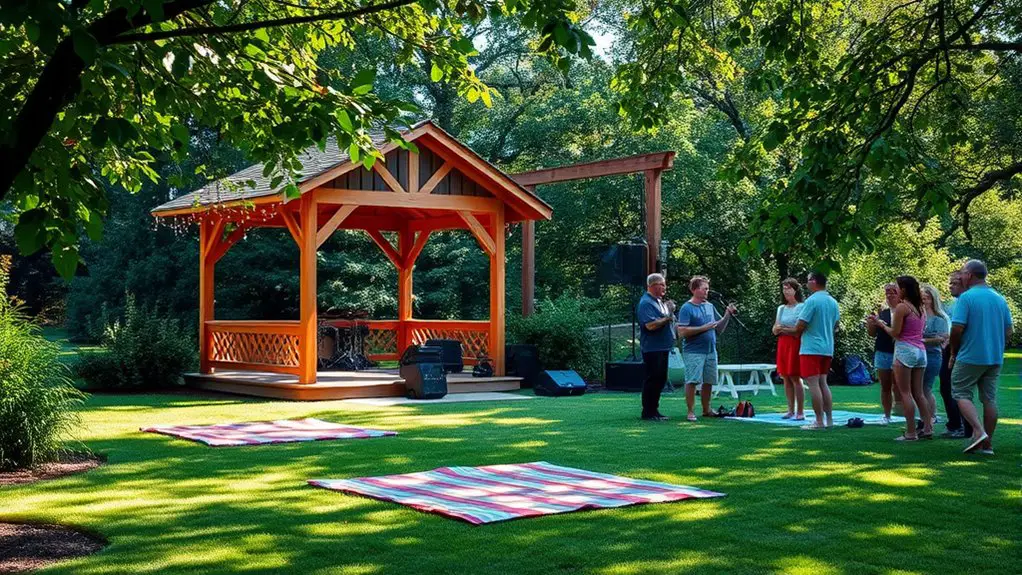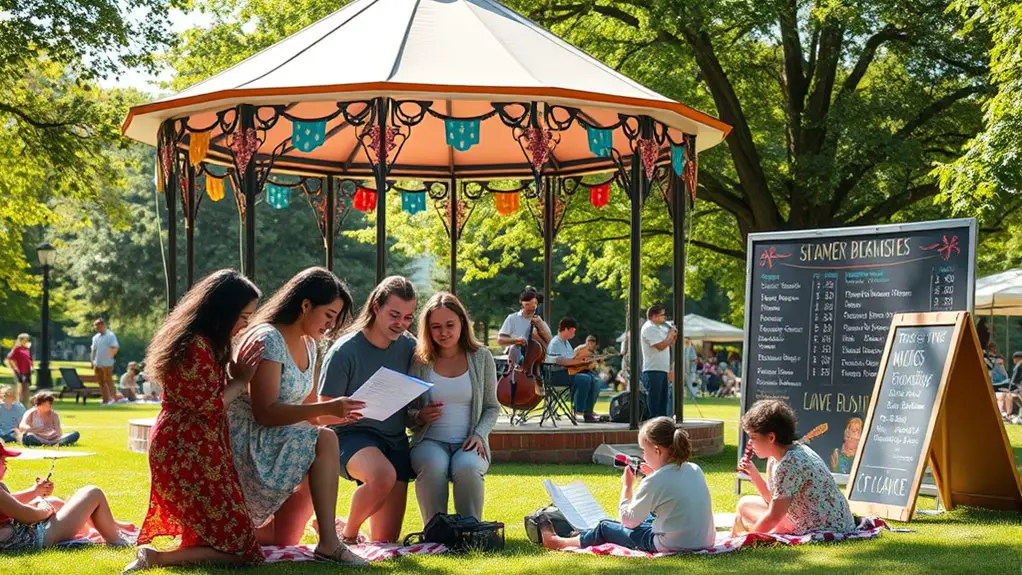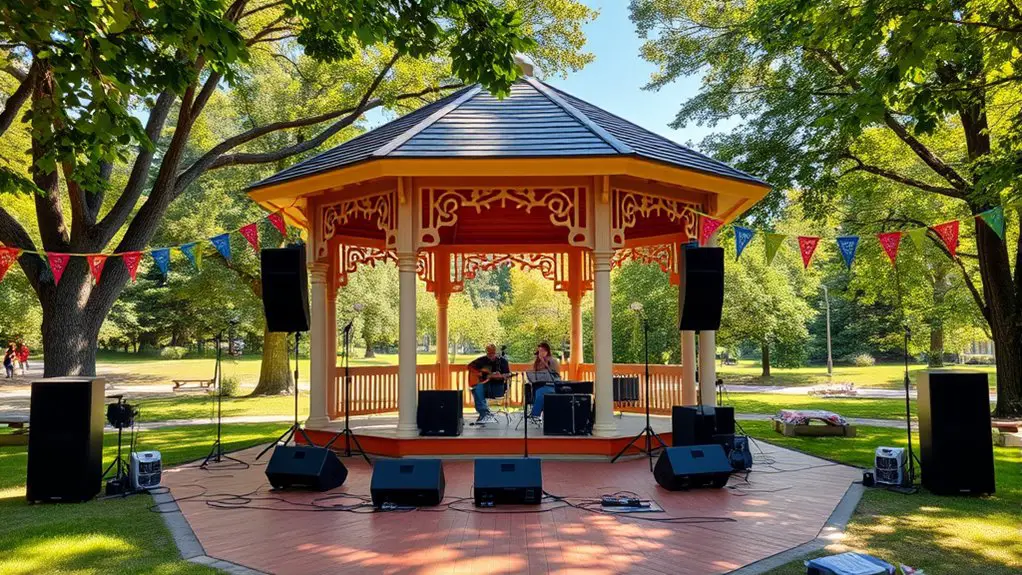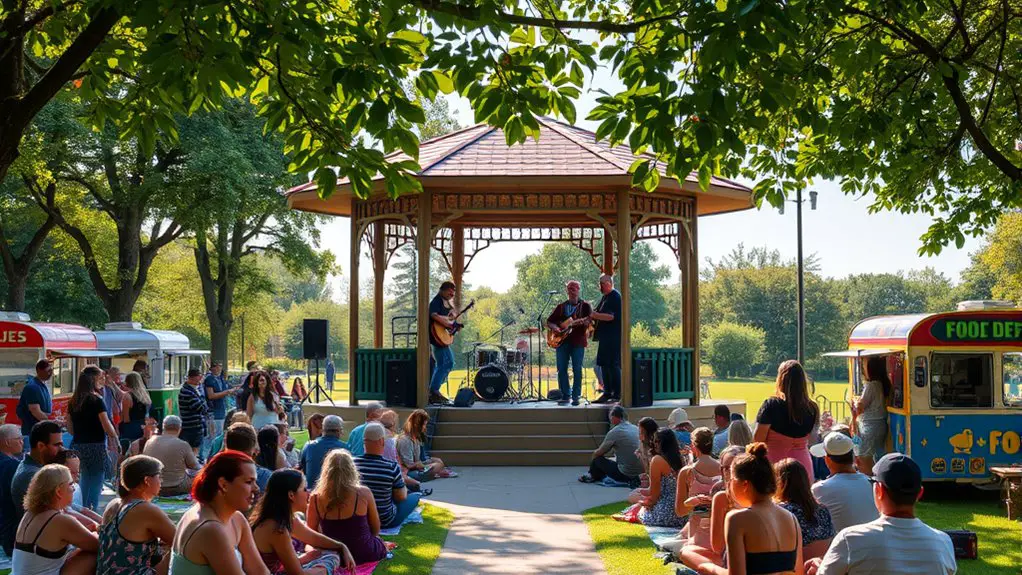To organize a local music event in a gazebo, start by selecting a scenic and accessible location. Check local regulations for permits and noise ordinances. Set a budget that includes venue rental and equipment costs. Curate a diverse lineup of musicians, focusing on local talent. On event day, guarantee proper setup of stage and sound equipment, while engaging local sponsors. Create a welcoming atmosphere with decorations and amenities. You’ll find additional insights on managing logistics and evaluating success if you continue.
Selecting the Perfect Gazebo Location

When you’re planning a local music event, selecting the perfect gazebo location can make all the difference in creating a memorable experience. Start by scouting areas that offer scenic views, as they not only enhance the atmosphere but also attract attendees. Look for a gazebo that overlooks a park, lake, or natural landscape, allowing the music to blend with nature.
Next, consider accessibility. Make sure your chosen location is easy for everyone to reach, including those with mobility challenges. Check for nearby parking, clear pathways, and ADA-compliant features.
Finally, think about the sound quality and how the gazebo’s structure interacts with the surrounding environment. A well-positioned gazebo can help amplify sound, ensuring that every note resonates with your audience. By focusing on these factors, you can create an inviting and enjoyable atmosphere that encourages freedom of expression and connection through music. Additionally, ensure that the gazebo is installed on flat, sturdy ground for stability, which is crucial for maintaining a safe environment during the event.
Understanding Local Regulations and Permits
After securing the ideal gazebo location, understanding local regulations and permits becomes a priority in the planning process. You’ll want to make sure your event runs smoothly and legally, so familiarize yourself with the necessary permit requirements. Here are some key points to take into account:
- Noise ordinances: Check any restrictions on sound levels and event hours.
- Public assembly permits: Determine if you need a permit for gathering a crowd.
- Vendor permits: If you plan to have food or merchandise, verify vendor regulations.
- Insurance requirements: Some localities may require liability insurance for public events. Additionally, be aware that permit requirements may vary based on the size and scope of your event, so it’s important to check with local authorities.
Budgeting for Your Music Event

When budgeting for your music event, you’ll need to account for venue rental costs, as this will often be your largest expense. Don’t forget to include equipment and supplies, like sound systems and lighting, to guarantee everything runs smoothly. A detailed budget will help you allocate funds effectively and avoid any surprise costs along the way.
Venue Rental Costs
Budgeting for venue rental costs is one of the most essential aspects of organizing a local music event. To guarantee you’re making informed decisions, conduct a thorough venue cost analysis. This will help you understand the market rates and negotiate effectively. Consider these key points during your planning:
- Research various venue options to compare pricing.
- Factor in additional fees like insurance, utilities, and cleanup.
- Develop rental negotiation strategies to secure the best deal.
- Set aside a contingency budget for unexpected expenses.
Equipment and Supplies
While organizing a local music event, accounting for equipment and supplies is essential to ensuring everything runs smoothly. Start by budgeting for sound equipment and stage lighting to create an inviting atmosphere. Consider your seating arrangement—make sure everyone has a good view while maintaining audience safety. Don’t forget vendor supplies for food and drink, as they can enhance the overall experience. Identify reliable power sources for your equipment and plan for weather considerations, like tents or coverings. Finally, invest in signage materials to guide attendees and communicate important information. By carefully planning these elements, you’ll foster an enjoyable, memorable event that reflects your passion for music and community.
Curating a Lineup of Talented Musicians
When curating a lineup of talented musicians, it’s essential to contemplate diverse genre representation to attract a wider audience. Highlighting local talent not only supports your community but also adds a unique flavor to the event. Balancing these elements will create an engaging experience that resonates with attendees.
Diverse Genre Representation
To create a truly memorable local music event, you’ll want to guarantee a diverse lineup that showcases various genres and highlights the unique talents of local musicians. Emphasizing genre diversity not only enriches the experience but also fosters audience engagement. Here are some genres to contemplate:
- Rock: Energizing performances that draw in crowds.
- Jazz: Smooth sounds that offer a sophisticated vibe.
- Folk: Heartfelt storytelling through acoustic melodies.
- Hip-Hop: Dynamic beats that resonate with younger audiences.
Local Talent Spotlight
Curating a lineup of talented musicians is essential for bringing your local music event to life, as it not only showcases the vibrant musical community but also creates a connection with the audience. Focus on local artist showcases that highlight diverse sounds and stories. To guarantee a well-rounded experience, consider collaborating with community members, including local schools and music organizations.
Here’s a simple way to organize your lineup:
| Time Slot | Artist Name |
|---|---|
| 2:00 – 2:30 | The River Band |
| 2:45 – 3:15 | Acoustic Dreams |
| 3:30 – 4:00 | Soulful Voices |
| 4:15 – 4:45 | Urban Beat Collective |
| 5:00 – 5:30 | Harmony Junction |
This structure helps you create a dynamic event that everyone will remember.
Setting Up the Stage and Sound Equipment

Setting up the stage and sound equipment for your local music event is essential for creating an engaging atmosphere and guaranteeing that both performers and audience members have an enjoyable experience. Start by planning your stage layout carefully, considering visibility and acoustics. Once you’ve got that sorted, focus on the sound equipment. Here’s a quick checklist to help you get started:
Setting up your stage and sound equipment is crucial for an unforgettable local music event experience.
- Stage Dimensions: Guarantee the stage is spacious enough for performers and their gear.
- Sound Equipment: Use quality microphones, speakers, and mixers to enhance sound clarity.
- Cabling: Keep cables organized and secured to avoid hazards.
- Sound Check: Schedule a dedicated time for a sound check to adjust levels and guarantee everything’s working. Additionally, consider setting up your event under a hardtop gazebo, as it provides reliable shelter from weather elements and enhances the overall experience with its weather-resistant features.
Promoting Your Event to the Community
Once the stage and sound equipment are in place, the next step is to get the word out about your event. Start with community outreach; connect with local groups and organizations that share your passion for music. Flyers in local cafés, community centers, and bulletin boards can generate interest.
Don’t underestimate the power of social media. Create an event page on platforms like Facebook and Instagram. Use eye-catching graphics and engaging content to attract attention. Share updates, behind-the-scenes moments, and artist spotlights to build excitement. Encourage your friends and followers to share the event, expanding your reach.
Consider using local influencers or musicians to help promote your event. Their endorsement can draw in crowds who value their opinions. By combining grassroots efforts with digital outreach, you’ll create a buzz that resonates throughout the community, ensuring your event is a memorable experience for everyone involved.
Engaging With Local Sponsors and Vendors
Engaging with local sponsors and vendors can greatly enhance the success of your music event. By establishing strong relationships, you not only secure funding and resources but also create a vibrant community atmosphere. Here are some effective strategies for sponsor outreach and vendor partnerships:
Engaging local sponsors and vendors fosters community and enhances the success of your music event.
- Identify potential sponsors: Target businesses that align with your event’s values and audience.
- Present a compelling proposal: Clearly outline the benefits of sponsoring, like brand exposure and community engagement.
- Foster vendor partnerships: Collaborate with local food, craft, and merchandise vendors to enrich the experience for attendees.
- Maintain communication: Keep sponsors and vendors updated on event progress and involve them in promotional efforts.
Creating a Welcoming Atmosphere for Attendees
Creating a warm and inviting atmosphere for attendees is crucial, especially when you want them to feel valued and connected to the event. Start by involving the community; invite local artists, schools, and organizations to participate. This not only fosters connections but also reflects shared joy and pride.
Next, enhance the space with festive decorations. Think colorful banners, twinkling lights, and vibrant flowers that reflect the local culture. Set up cozy seating areas where attendees can relax and socialize, encouraging interaction and camaraderie among guests.
Don’t forget to include convenient amenities, like food stalls offering local cuisine, which can help create a festive vibe. Music is critical too; choose a diverse lineup that resonates with various tastes to attract a broader audience. Additionally, consider setting up a gazebo with mosquito netting to ensure a comfortable environment for all attendees, free from pesky insects.
Managing Logistics on the Day of the Event
On the day of the event, managing logistics effectively is essential to guarantee everything runs smoothly. You’ll want to stick to your event timeline while ensuring that all volunteers are well-coordinated. Here’s how to keep things on track:
Effective logistics management on event day ensures smooth operations and volunteer coordination. Stick to your timeline for best results.
- Setup: Arrive early to oversee stage and equipment setup, ensuring everything’s in place.
- Communication: Use walkie-talkies or group messaging apps for real-time updates among your volunteers.
- Checkpoints: Establish key locations for volunteers to report to you for any issues or questions.
- Flexibility: Be prepared to adjust plans as needed; unexpected situations can arise, and adaptability is key. Additionally, consider securing the gazebo with proper anchoring to prevent any damage during the event.
Evaluating the Success of Your Music Event
How do you determine whether your local music event was a success? Start by gathering attendee feedback. Create a simple survey to collect insights on their experience, covering aspects like the lineup, venue atmosphere, and overall enjoyment. This input is invaluable for understanding what worked and what didn’t.
Next, analyze performance metrics. Track ticket sales, attendance numbers, and social media engagement to gauge your event’s reach. Did you hit your targets? Were there unexpected spikes in interest?
Combine these insights to form a holistic view of your event’s success. Reflect on whether your goals were met—whether that’s fostering community, promoting local talent, or simply providing a great night out.
Finally, share your findings with your team. Celebrate wins and discuss areas for improvement. With this structured approach, you’ll gain clarity and be better equipped to enhance future events.
Frequently Asked Questions
What Insurance Do I Need for a Local Music Event?
Have you thought about potential mishaps? You’ll need liability coverage to protect against accidents and injuries. Plus, check local regulations for event permits; they’re essential for a smooth, worry-free experience during your event.
How Can I Ensure Safety and Security During the Event?
To guarantee safety and security during your event, implement crowd management strategies and develop an emergency plan. Communicate clearly with attendees about protocols, and make certain staff is trained to handle potential incidents effectively.
What Should I Do if It Rains on the Event Day?
If it rains, don’t panic! You’ll need a solid rain contingency and a weather plan. Set up tents, have umbrellas ready, and communicate with attendees about changes. Embrace the freedom of spontaneity and enjoy the show!
How Can I Handle Sound Complaints From Nearby Residents?
To handle sound complaints, consider implementing noise reduction strategies, like sound barriers. Engage with the community beforehand, addressing concerns and ensuring everyone’s heard. Open communication fosters understanding, making your event enjoyable for all while respecting neighbors.
What Are Effective Ways to Gather Attendee Feedback Post-Event?
Gathering attendee feedback post-event is essential; it’s like finding gold in a river. Use surveys methods with clear questions and offer feedback incentives, ensuring you capture valuable insights to improve future events and enhance freedom-loving experiences.

